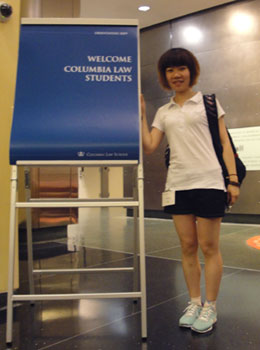曹暑:美国哥伦比亚大学yh1122银河国际(2009年秋季学期)
时间:2010-04-16 来源:作者:
 Courses at Columbia
Courses at Columbia
Since we the exchange students got the F-1 visa to U.S., according to the academic requirements at Columbia, we have to at least fulfill twelve credits for one semester there.
Courses at Columbia are generally divided into two categories—the lecture and the seminar. The lecture course is more like the usual course in PKU Law School. During the class, most of the time, it is the professor who does the talking, but students are also welcomed to interrupt to ask questions—actually, it is normal to always see hands putting up during class. Usually, the contents of such course would be rather a basic introduction about a specific area in law. On the contrary, the seminar course would be much smaller and the contents would be much more advanced. There would be fewer than twenty students in one seminar. And during the class, the students would be required to take part in the discussion actively. For instance, during the WTO laws seminar I took for this semester, there are different topics for each session. Before each session, the students would be given a particular topic and bunch of reading materials. Then during the session, the professor would invite one or more lecturers, who have done profound research of that topic, to deliver a speech and discuss with the students.
The thing impressed me most about courses at Columbia is that courses there are very practice-oriented. To put it in another way, students can actually directly apply the knowledge that they have learned in class to the real practice. Take the international financial transactions I took as an example. The professor was a partner at Linklaters. During the class, he not only did the introduction to the students, but would encourage students to learn how to use the knowledge to deal with a real case. There are five panel discussions for this course through the whole semester. In each panel discussion, the professor gave us a practical case and then asked us to solve the issue. Sometimes, it’s a law firm scenario and we have to write a memo for the partner; sometimes, it’s a negotiation between two parties and we have to settle down an agreement during the negotiation; sometimes, it’s a tele-conference and we have to answer questions from the clients.
Exams at Columbia
Generally, exams at Columbia include several major forms: open book proctored exam, close book proctored exam, take home exam, and paper. Usually, the exam for a seminar is to write a 20-25 pages long final paper. The open book exam lasts three to four hours. Students can choose to handwrite the whole answers, or to tap them using their own laptops.
Students at Columbia
The LL.M. program at Columbia is not as large as the program at NYU Law School. Each year, Columbia would admit around 200 students for its LL.M. program. Compared to some other law schools in the U.S., Columbia prefers LL.M. applicants who have got years of work experience before they enter into Columbia. Applicant who just graduates is rather unlikely to get the admission decision from Columbia. Of all the LL.M. students at Columbia, most of them were lawyers before.
J.D. students in American law schools are usually called 1Ls, 2Ls, and 3Ls. During the first year in law school, J.D. students mainly have to take some compulsory courses, such as the contract law, the tort law, and legal methods. The first year academic records would be most important for J.D. students, since after the first year finished, they have to apply for internship in public or private sectors. Therefore, competition is rather fierce for J.D. students. It is said that in the U.S., maybe the smartest students go to medical schools, but the most hard-working students would definitely go to law schools.
Ordinarily, the library at Columbia would be closed after midnight. But during the exam period, it would open for 24 hours. Sometimes, I went to the library early in the morning at around seven o’clock. But there were already students studying there, who actually had not gone home yet.
Career Education at Columbia
One thing of Columbia which is very different from law schools in China is that it emphasizes a lot about career education for the students. There will be specific sessions held by the career office at Columbia to instruct students how to prepare their CV, how to write a cover letter, and how to perform during an interview. Students will also be welcomed to directly ask instruction person to person from the stuff at the career office, and there will also be moot interview for students as well.



